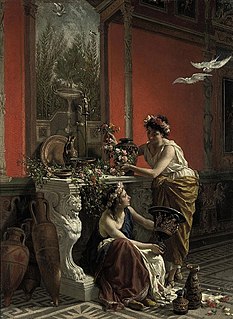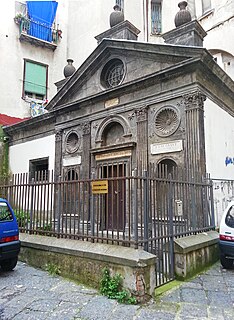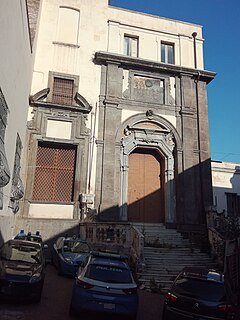This article needs additional citations for verification .(October 2014) |


Giovanni Battista Nauclerio (Naples, 1666 - Naples, 1739) was an Italian architect and engineer, active in Naples, Italy.
This article needs additional citations for verification .(October 2014) |


Giovanni Battista Nauclerio (Naples, 1666 - Naples, 1739) was an Italian architect and engineer, active in Naples, Italy.
Nauclerio is described as one of the Naples architects who went against the grain, paving the way for columned neoclassicism of the 18th century. [1] He took over the work for the completion of the cloister of San Domenico Maggiore from his collaborator Francesco Antonio Picchiati. In 1704, he designed the church and monasteries of San Francesco degli Scarioni. In 1704, he designed the church of Santi Demetrio e Bonifacio. In 1708, he completed the construction of the church of San Giovanni Battista delle Monache, which had been designed by Francesco Picchiatti. In 1720, he designed Villa Paternò on the hill of Capodimonte. After the death of Arcangelo Guglielmelli in 1723, he helped complete the church of Santa Maria delle Grazie a Mondragone. He also helped the main altar for the church of San Diego all'Ospedaletto, the baldacchino in San Pietro ad Aram, and likely aided in the restructuring of Santi Bernardo e Margherita and the church of Santa Maria di Caravaggio.
Ottaviano Nonni, called Il Mascherino, was an Italian architect, sculptor, and painter born in Bologna. Apprentice of Giacomo Barozzi da Vignola, he was active in Emilia and in Rome, where he had been living in the rione of Borgo, in the road still bearing his name.
The Naples Conservatory of Music is a music school located in Naples, Italy. It is situated in the complex of San Pietro a Majella.

Santa Maria la Nova is a Renaissance style, now-deconsecrated, Roman Catholic church and monastery in central Naples. The church is located at the beginning of a side street directly across from the east side of the main post office, a few blocks south of the Church and Monastery of Santa Chiara. Today the adjacent monastery is a meeting site and hosts the Museo ARCA of modern religious art.

Domenico Antonio Vaccaro was an Italian painter, sculptor and architect. He created many important sculptural and architectural projects in Naples. His later works are executed in an individualistic Rococo style.

Francesco Antonio Picchiatti was an Italian architect of the Baroque period active in Naples. He is also called Picchetto. He was son of Bartolommeo Picchiatti, who also served as an architect in Naples.

Cesare Mariani was an Italian painter and architect of the late-19th century, active in Rome and Ascoli Piceno.

Giovanni Battista Benaschi, or Beinaschi, (1636–1688) was an Italian painter and engraver active in the Mannerist and Baroque style.
Vincenzo della Greca was an Italian architect.

Giovanni Battista Cavagna, also known as Cavagni or Gavagni was an Italian architect, engineer, and painter mainly in Naples, but also in Rome and Ascoli Piceno, Italy.

Antonio del Massaro da Viterbo, or Antonio da Viterbo, nicknamed il Pastura was an Italian painter.

Giovanni Francesco Mormando was an Italian architect active in Naples, Italy.

The Ospedale degli Incurabili or Complesso degli Incurabili is an ancient and prominent hospital complex located on Via Maria Longo in central Naples, Italy. Part of the complex, including the remarkable pharmacy, are now the Museo delle arti sanitarie of Naples.

The Church of Santa Maria di Caravaggio is a Baroque Catholic church located on Piazza Dante, in Naples, Italy.

San Giovanni Battista delle Monache is a former Roman Catholic church located in Via Costantinopoli 106 in central Naples, region of Campania, Italy.

The church of Santi Severino e Sossio and the annexed monastery are located on via Bartolommeo Capasso in Naples, Italy.

Michelangelo Naccherino was an Italian sculptor and architect, active mainly in the Kingdom of Naples, Italy.
Arcangelo Guglielmelli was an Italian architect and painter, active in his native Naples, Italy, in a late-Baroque style. He was involved in the building and reconstruction of churches, many of which had been damaged by the earthquakes of 1688 and 1694.

Santissima Trinità delle Monache is a large former monastery and church in central Naples, Italy; it now serves as a military hospital. It is located in the Spanish Quarter of the city.

Santi Demetrio e Bonifacio is a former-Roman Catholic church located on Piazzetta Teodoro Monticelli, in central Naples, Italy. It is now used for meetings and exhibitions by the Department of Architecture of the University of Naples.